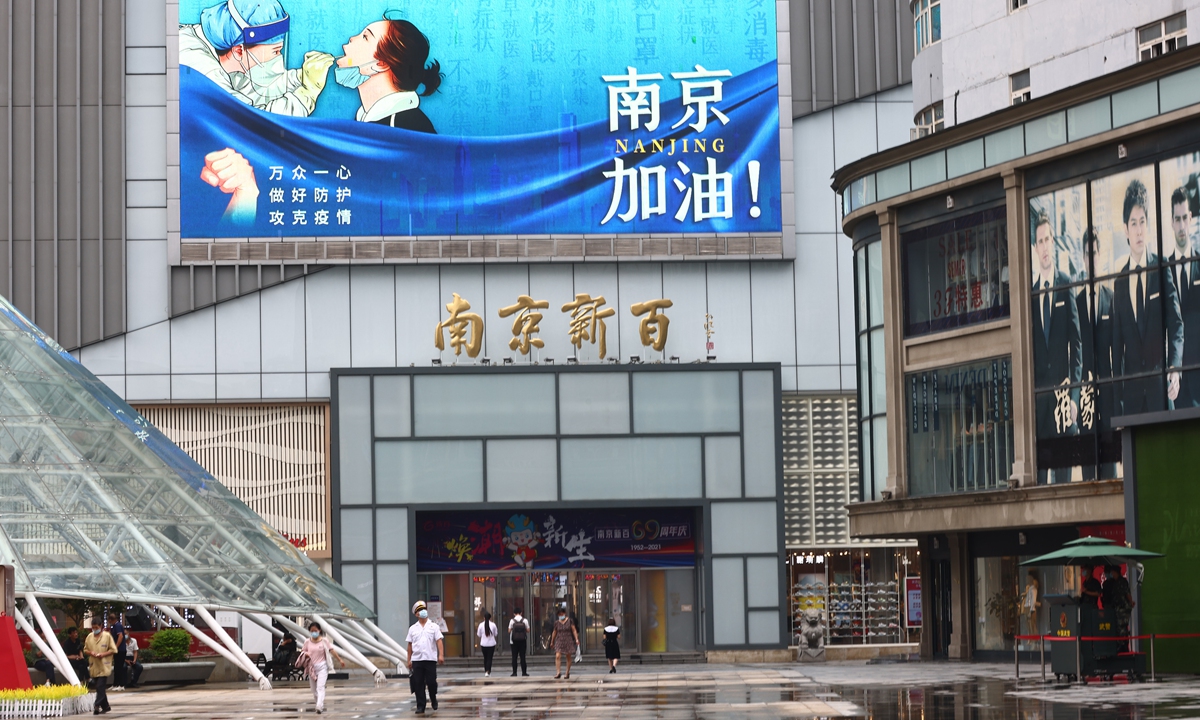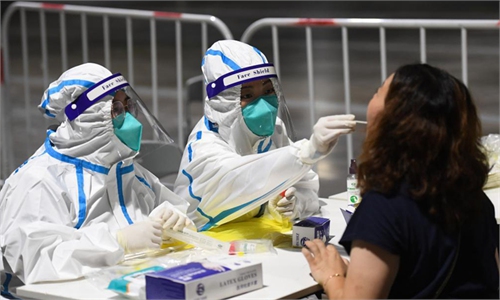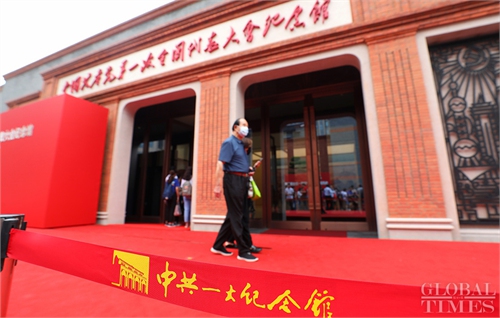New COVID-19 outbreak in E.China poses challenges for economy in H2
Businesses worried about potentially profound impact

A billboard outside a shopping mall reads "Nanjing, stand strong" on Wednesday as the city in East China's Jiangsu Province is fighting a fresh COVID-19 resurgence, which had infected 159 in the province and spread to at least 10 cities in five provinces (See story on Page 4). Photo: cnsphoto
The new wave of the Delta variant strain outbreak in Nanjing, the most extensive domestic COVID-19 contagion after the Wuhan epidemic in 2020, has triggered worries about whether the resurgence will have a more profound impact on businesses, manufacturing and consumption, and drag down the just-reviving Chinese economy in the second half.
Since the first confirmed case of the outbreak was detected on July 20 at Nanjing Lukou International Airport, capital city of East China's Jiangsu Province, more than 260 infections have been reported, including cases in more than 26 other cities, with Beijing and Sichuan Province's Chengdu among them.
The outbreak may spread to more regions in the short term, He Qinghua, a senior official at the National Health Commission, said at a press conference on Saturday.
As one of China's most economically active regions, Jiangsu Province, along with neighboring Zhejiang Province and Shanghai, is home to most of the country's exporters with businesses ranging from Christmas products to vehicles.
Companies told the Global Times that although the impact is still limited, the rapid spread of the epidemic may lead to a delay in order deliveries and personnel exchanges during the peak season.
"I see no impact on my business so far, but I'm really worried about whether the situation will get worse," Zhao Ming, owner of an auto parts factory in Nantong, East China's Jiangsu Province, told the Global Times on Sunday.
But Zhao said unlike the Wuhan outbreak last year, he's more prepared since anti-epidemic materials such as masks, sanitizers and quarantine rooms are abundant. "We can react more rapidly and may not lead to large-scale lockdown like the last time."
"I have no idea how much loss we'll see if the new Nanjing outbreak continues to spread to more regions. The second half of the year would be really tough," Zhu Hongbin, who owns a shop selling Christmas tinsel overseas in Yiwu, East China's Zhejiang Province, told the Global Times on Sunday.
There has been a marked drop in the number of overseas buyers since May, Zhu said, noting that he is afraid that the situation may deteriorate if the recent outbreak affects cross-border business activities.
Zhu said that he is now cautious in receiving new orders. "Several containers of Christmas products that should have been shipped to Europe in June and July are still piled up at our warehouses because the shipping agency couldn't book a container due to soaring freight costs."
Given the region's manufacturing capacity and economic strength, if the situation gets worse, the impact could be more profound than the 2020 outbreak in Wuhan, Cong Yi, a professor at the Tianjin University of Finance and Economics, told the Global Times on Sunday.
However, Cong believed that with China's "most advanced and responsible" anti-pandemic system, it's very likely the resurgence could be contained within a month.
As of Sunday, apart from Jiangsu, more provinces and municipalities have told residents to reduce unnecessary intra-provincial trips, while some cities in provinces such as East China's Zhejiang and Fujian told teachers and students to cancel exchanges and training activities outside of the provinces during the summer holidays.
Meanwhile, as the latest outbreak is happening during summer holidays, when people tend to gather at scenic spots, industry players said that it will have a severe impact on domestic tourism, which has been struggling to recover.
"The impact of the resurgence on the summer tourism market is grim, with popular scenic spots in central and eastern China expected to see more than 50-percent plunges in tourism revenue," Xu Xiaolei, marketing manager at China's CYTS Tours Holding Co, told the Global Times over the weekend.
Without the latest outbreak, the domestic tourism market had been expected to recover to 90 percent of the pre-pandemic level during the summer holidays, Xu said. He added that the sudden and fast spread of recent cases had hurt consumers' confidence, leading many to cancel their trips.
"Overall, as strict anti-pandemic measures are normalized across the country, and with local authorities' success in containing sporadic cases over the past year, the impact of this wave may still be limited, although there will surely be a temporary negative impact," Cong said.
In the second half, amid domestic and foreign uncertainties, the central government will give priority to support for the real economy and domestic consumption expansion, Cong noted.
"It has been proven that China is the most 'stabilized economy' in the world over the past year," said Cong.
The Political Bureau of the Communist Party of China Central Committee held a meeting on Friday to study and analyze the current economic circumstances and make plans for related work for the second half of 2021.
The domestic economic recovery is still not firm and unbalanced, according to the meeting. It also stressed maintaining consistent, stable and sustainable macro policies, sound coordination to mesh this year's policies with those for 2022, and moves to keep the Chinese economy running within an appropriate range, according to the Xinhua News Agency.



